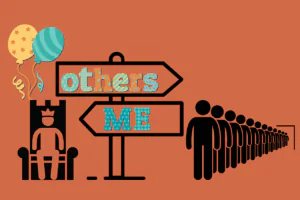guest post by Gayle Pape, LCSW
Is it Teen Angst or Depression?
You’ve seen it and heard it. Grunts, sighs, and eye rolls. Phrases like I’m fine – leave me alone!… I hate my life!,,, You embarrass me!… I have no friends!… I can’t believe he blocked me on Snapchat!… I’ll never pass high school – I may as well quit now!… I don’t care! And… the infamous and sassy OMG! There is the rare I love you, and occasional Thanks! It’s clear that emotions run high with teens. But are those high emotions teen angst or depression?
If you have a teen, you know it can be a roller coaster ride – one you are on, too! You know it’s natural for teens to experience mood swings and have hard days. But it also can be a struggle to distinguish between typical adolescent behavior and signs of depression in teens. When teens have frequent extreme mood swings over an extended period of time, that can be cause for concern. This is especially true when combined with other behaviors that can indicate the presence of teenage depression.
What is Teen Angst?
Teen angst is defined as feelings of worry or dread, usually brought on by insecurities, worry, and apprehension. It makes sense that teens would experience angst given the physical, hormonal, and emotional changes that characterize adolescence.
Angst is a common reaction to many situations: a difficult test, a sports event, a challenging relationship, etc. Teen angst is part of the process of maturing into a healthy adult – a sign of adolescents navigating and learning to regulate their emotions. This is especially true when parents understand what teens are going through and are supportive in processing their feelings.
But what if your teen’s angst is becoming increasingly extreme and worrisome? How do you understand and help your teen when you suspect it’s more than the typical range of angst?
What is Teen Depression?
Depression is a mental health disorder characterized by persistently depressed mood or loss of interest in activities, causing significant impairment in daily life. Depression is a serious mental health condition that is potentially life-threatening if not treated. When left untreated, the emotional pain a depressed teen undergoes can lead to substance abuse, self-harm, eating disorders, and even suicide attempts.
Sometimes a teen can become seriously depressed after a divorce in the family, the emergence of financial problems in the family, the death of a loved one, or breaking up with a boyfriend or girlfriend. Other times — like with other medical conditions — depression just happens without an obvious cause.
Many factors contribute to depression, including biological, emotional, and circumstantial issues. One of the most common causes of depression is untreated trauma, whether that’s acute trauma, vicarious trauma, chronic trauma, or PTSD.
According to recent data from the Substance Abuse and Mental Health Services Administration (SAMHSA), 9.4 percent of teens ages 12 to 17 have a depressive episode, with at least one significant life impairment, within a single year. Major impairments are defined as interfering with or limiting a person’s ability to engage in daily activities. Of those teens diagnosed with depression, 71 percent experienced severe impairment due to their depression.
Related Reading: How to Recognize Generalized Anxiety Disorder in Teens
Risk Factors and Warning Signs of Teen Depression
Risk factors for depression include having other mental health conditions (for example, anxiety, eating disorder, bipolar disorder, etc.), a diagnosis of learning disabilities and/or ADHD, or chronic physical/medical illnesses. There are numerous medical conditions that increase a teenager’s likelihood of suffering from depression. Thyroid disorders, anemia, diabetes, and chronic pain are some of the most common. Other risk factors are self-critical tendencies or a pessimistic attitude, abuse of alcohol or substances, or identifying as LGBTQIA+ in a non-accepting or supportive environment.
There are also some warning signs that a teenager may be depressed. If you suspect your teen may be depressed, consider whether they are exhibiting any of the following:
- Feelings of sadness, hopelessness, or loneliness
- Declining school performance, attendance problems, a drop in grades, and/or frustration with schoolwork. This is even common in teenagers who were previously good students

- Loss of interest in social and sports activities.
- Withdrawal from relationships. Teens with depression may withdraw from some, but not all, of their relationships. They might pull away from some and sustain others, start mixing with a different peer group, or just pull away from parents.
- Sleeping too little or too much
- Significant changes in weight or appetite
- Nervousness, agitation, irritability, or easily frustrated or prone to anger outbursts Teens struggling with depression tend to demonstrate irritability/crankiness, more than sadness
- Lack of self-confidence and self-worth. Low self-esteem might play out as expressions of ugliness, shame, unworthiness, and failure
- Anxiety
- Mood swings
- Difficulty concentrating and making decisions having low energy
- Suicidal thoughts
- Headaches or body aches with no identifiable medical explanation
- Substance abuse. Teenagers who are depressed frequently turn to drugs and alcohol to self-medicate, numb out, and/or deal with their emotional struggle
- Excessive time on the Internet, computer, or gaming
- Engaging in risky behavior This may show up in a variety of ways – recklessness, drinking, unsafe sex
- Extreme reactions to what they see as criticism or rejection. Teens with depression often experience feelings of worthlessness. They become extremely sensitive to failure, rejection, or criticism. Teenagers who are overachievers tend to be especially susceptible to this sensitivity.
Causes of Depression in Teens
In addition to the risk factors mentioned above, there are other factors that that may increase a teenager’s likelihood of developing depression. Some of them originate with the family, such as genetics. If you or other family members suffer from depression (or have in the past), your teen has a higher chance of being diagnosed with depression.
Current family problems can contribute as well. A teen’s chances of struggling with depression are increased if there is ongoing familial conflict, or a major loss occurs within the family (such as a death). Childhood trauma, such as abuse, neglect, or loss of a parent can also lead to depression. Another family cause is learned helplessness—growing up in a way that makes a teen believe they have no control over what happens to them.
Low self-esteem and/or a lack of confidence is a common struggle and is also a strong predictor for depression. Loneliness can also cause depression because of feeling like an outsider or being ostracized by their peers. In addition, teenagers often go through phases of being more then less disconnected from their parents.
How To Talk About Depression with Your Teen
The symptoms of depression vary. Also, teens who are suffering from depression may not be able or willing to express how serious their symptoms are. So it is important for parents to ask questions and look for signs of depression symptoms. Depression doesn’t go away on its own. Furthermore, untreated depression can lead to severe consequences such as a suicide attempt or hospitalization.
With the number of teens struggling with depression today, it is likely your teenager has been affected in some way, whether personally, or through a friend or peer. Therefore, it is very important to start the conversation about depression (and mental health in general) with your teen. It is also important to keep in mind where your teenager is developmentally when having conversations with them.
Ways to begin the conversation:
- Educate yourself Learn about depression in general, and how depression affects teenagers. Know the risk factors and warning signs.
- Start the conversation Let your child know what you have observed. For example, let them know you have noticed a drop in grades/mood changes/isolation from friends/etc.
- Be open Tell your teen that you are there for them, no matter what. For a teen to open up, it is important they know they can tell you anything. Invite your teen to talk. Be available, but not intrusive, persistent but not invasive.
- Normalize If you have been affected by depression, it can be very helpful to share your personal experience with your teen. This is a great way to normalize what your teen is going through and may even help them feel less alone.
- Ask clarifying questions It is very important to have as much information as possible as to how depression is affecting them specifically. (i.e. “how often are you feeling this way).
- Encourage treatment Talk to your child about treatment options and provide them with resources. By doing this, you are educating your teen about the options available to them without being forceful. Remember, you cannot heal your teenager’s depression for them. For any treatment to be effective, they must want to get help and heal.
How to Help Your Teen or Someone who is Suicidal
If you think your teen may have suicidal depression or is exhibiting suicidal signs and is in immediate danger, call 911, your local emergency number or a suicide hotline. In the U.S., call or text 988 to reach the 988 Suicide & Crisis Lifeline, available 24 hours a day, seven days a week. You can also use the Lifeline Chat. Services are free and confidential. The Suicide & Crisis Lifeline in the U.S. has a Spanish language phone line at 1-888-628-9454 (toll-free).
Therapy for teenage depression
There are different options when it comes to treatment for teenage depression. Getting a diagnosis from a healthcare provider as early as possible is critical, along with the possibility of the use of medication. Therapy for teens gives them an outlet to process feelings, learn coping skills, and improve their overall mood and well-being.
Different types of therapy for depression include CBT (Cognitive Behavioral Therapy), EMDR (Eye Movement Desensitization and Reprocessing), DBT (Dialectical Behavior Therapy), Somatic Experiencing Therapy, and Art Therapy.
Therapists at Life Care Wellness are certified in a variety of techniques to help with depression. They have experience working with teenagers and young adults and will work with you to create an individualized treatment plan. Please reach out to us in our Northern Illinois locations in Glen Ellyn, Chicago (Jefferson Park), or Sycamore .
Gayle Pape has 23 years of experience working with children and adolescents. She uses a strength-based approach and provides a safe space to assist in the processes of empowerment, healing, and growth. Her therapeutic approaches include Cognitive Behavioral Therapy (CBT), Eye Movement Desensitization and Reprocessing (EMDR), Mindfulness-Based Therapy, Strength-Based Therapy, Solution Focused Therapy, Art Therapy, and Play Therapy. She sees clients in the Glen Ellyn office.







